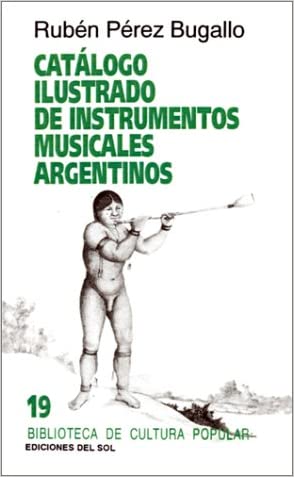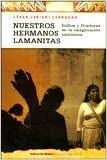HISTORIAS Y CULTURAS DE LA DIVERSIDAD SEXUAL / RODRIGO NAVARRETE (COMPILADOR).

LA ESTUPIDEZ: IDEOLOGÍAS DEL POSTMODERNISMO

CRÍMENES Y OTRAS MUERTES VIOLENTAS EN LA HISTORIA DE ROQUETAS DE MAR

AVES, MARAVILLOSAS AVES.

CATÁLOGO ILUSTRADO DE INSTRUMENTOS MUSICALES ARGENTINOS.
 Una descripción de los instrumentos musicales criollos e indígenas del país, con la especificación de sus características, la forma y circunstancias en que son ejecutados y la música que se toca con ellos. Constituye una guía insoslayable en el tema. Contiene un estudio de la forma, modos de uso y funciones de los instrumentos, y también su origen, transformaciones e itinerarios. Respaldada en su casi totalidad por fotografías y dibujos. El autor es especialista en musicología y etnomusicología del Conicet y del Inapla.
Una descripción de los instrumentos musicales criollos e indígenas del país, con la especificación de sus características, la forma y circunstancias en que son ejecutados y la música que se toca con ellos. Constituye una guía insoslayable en el tema. Contiene un estudio de la forma, modos de uso y funciones de los instrumentos, y también su origen, transformaciones e itinerarios. Respaldada en su casi totalidad por fotografías y dibujos. El autor es especialista en musicología y etnomusicología del Conicet y del Inapla.INDÍGENAS, MEXICANOS Y REBELDES. PROCESOS EDUCATIVOS Y RESIGNIFICACIÓN DE IDENTIDADES EN LOS ALTOS DE CHIAPAS.
 ESTE TRABAJO PARTE DELAS INTERROGANTES ACERCA DE POR QUÉ LA EDUCACIÓN ESCOLAR SIGUE REPRESENTANDO UN PROBLEMA PARA LA POBLACIÓN INDÍGENA DE MÉXICO. PERO, JUNTO A ESTA CUESTIÓN CENTRAL APARECEN INMEDIATAMENTE OTRAS: ¿POR QUÉ SE CONSIDERA QUE LA POBLACIÓN INDÍGENA REPRESENTA UN PROBLEMA EN LAS POLÍTICAS DE EDUCACIÓN ESCOLAR DE MÉXICO? ¿QUÉ PERSPECTIVAS EXISTEN PARA LA SOLUCIÓN DE LAS DIFICULTADES EDUCATIVAS EN LAS CULTURAS INDÍGENAS? ÉSTAS PRESENTAN CIERTA AMBIGÜEDAD PUES LAS RESPUESTAS DEPENDEN DE LA POSICIÓN SOCIAL Y POSTURA POLÍTICA DE QUIENES SE PLANTEEN LAS INTERROGANTES ASÍ COMO DE QUIENES TIENEN LAS RESPUESTAS. POR OTRO LADO LAS RESPUESTAS ESTÁN ÍNTIMAMENTE RELACIONADAS PUES EL HECHO DE QUE LA EDUCACIÓN REPRESENTE UN PROBLEMA PARA LOS INDÍGENAS SE DEBE A QUE EN ELLA SE ENSAYAN MODELOS EDUCATIVOS Y PEDAGÓGICOS EN CUYA CONSTRUCCIÓN NO SON TOMADAS EN CUENTA SUS CONDICIONES SOCIALES, CULTURALES, ECONÓMICAS, POLÍTICAS, RELIGIOSAS, DE GÉNERO, ETC., POR LO QUE EL MODELO EDUCATIVO, EN PRIMERA INSTANCIA, ES PERCIBIDO Y RECIBIDO COMO ALGO AJENO. EN ESTE TEXTO SE ABORDAN DIRECTO ESTAS PREGUNTAS Y SE PROPONE UN ANÁLISIS PARA SUS RESPUESTAS.
ESTE TRABAJO PARTE DELAS INTERROGANTES ACERCA DE POR QUÉ LA EDUCACIÓN ESCOLAR SIGUE REPRESENTANDO UN PROBLEMA PARA LA POBLACIÓN INDÍGENA DE MÉXICO. PERO, JUNTO A ESTA CUESTIÓN CENTRAL APARECEN INMEDIATAMENTE OTRAS: ¿POR QUÉ SE CONSIDERA QUE LA POBLACIÓN INDÍGENA REPRESENTA UN PROBLEMA EN LAS POLÍTICAS DE EDUCACIÓN ESCOLAR DE MÉXICO? ¿QUÉ PERSPECTIVAS EXISTEN PARA LA SOLUCIÓN DE LAS DIFICULTADES EDUCATIVAS EN LAS CULTURAS INDÍGENAS? ÉSTAS PRESENTAN CIERTA AMBIGÜEDAD PUES LAS RESPUESTAS DEPENDEN DE LA POSICIÓN SOCIAL Y POSTURA POLÍTICA DE QUIENES SE PLANTEEN LAS INTERROGANTES ASÍ COMO DE QUIENES TIENEN LAS RESPUESTAS. POR OTRO LADO LAS RESPUESTAS ESTÁN ÍNTIMAMENTE RELACIONADAS PUES EL HECHO DE QUE LA EDUCACIÓN REPRESENTE UN PROBLEMA PARA LOS INDÍGENAS SE DEBE A QUE EN ELLA SE ENSAYAN MODELOS EDUCATIVOS Y PEDAGÓGICOS EN CUYA CONSTRUCCIÓN NO SON TOMADAS EN CUENTA SUS CONDICIONES SOCIALES, CULTURALES, ECONÓMICAS, POLÍTICAS, RELIGIOSAS, DE GÉNERO, ETC., POR LO QUE EL MODELO EDUCATIVO, EN PRIMERA INSTANCIA, ES PERCIBIDO Y RECIBIDO COMO ALGO AJENO. EN ESTE TEXTO SE ABORDAN DIRECTO ESTAS PREGUNTAS Y SE PROPONE UN ANÁLISIS PARA SUS RESPUESTAS.NUESTROS HERMANOS LAMANITAS. INDIOS Y FRONTERAS EN LA IMAGINACIÓN MORMONA.

TIPOLOGÍAS DE REGIONES EN LA UNIÓN EUROPEA Y OTROS ESTUDIOS
 Esta obra recoge una miscelánea de artículos de autores españoles y brasileños sobre desarrollo regional que demuestran que, en este aspecto, las experiencias de ambos países son cada vez más semejantes. Aunque el sistema socioeconómico imperante se basa en postulados neoliberales, con una disminución del papel de los estados en las tendencias del desarrollo, todavía perviven políticas regionales subsidiadas con fondos públicos que se resisten a desaparecer. Esta aseveración es válida tanto para España como para Brasil y puede aplicarse, en general, a toda Europa y América Latina. Medamérica, desde su fundación hace ya veinte años, ha tenido como objetivo tender puentes académicos entre Barcelona y América Latina mediante la publicación de libros, la organización de seminarios internacionales, la creación de convenios entre la Universidad de Barcelona y diversas instituciones de Brasil y México, y la realización de más de treinta tesis de doctorado.
Esta obra recoge una miscelánea de artículos de autores españoles y brasileños sobre desarrollo regional que demuestran que, en este aspecto, las experiencias de ambos países son cada vez más semejantes. Aunque el sistema socioeconómico imperante se basa en postulados neoliberales, con una disminución del papel de los estados en las tendencias del desarrollo, todavía perviven políticas regionales subsidiadas con fondos públicos que se resisten a desaparecer. Esta aseveración es válida tanto para España como para Brasil y puede aplicarse, en general, a toda Europa y América Latina. Medamérica, desde su fundación hace ya veinte años, ha tenido como objetivo tender puentes académicos entre Barcelona y América Latina mediante la publicación de libros, la organización de seminarios internacionales, la creación de convenios entre la Universidad de Barcelona y diversas instituciones de Brasil y México, y la realización de más de treinta tesis de doctorado.DISCURS SOBRE EL SENDERI (VILAR ROCA, GERARD)

DOCENTES, PROFESIONALES E INVESTIGADORES ANTE LOS DESAFIOS EDUCATIVOS DE LAS RELACIONES INTERGENERACIONALES. LA PROPUESTA DE LAS MUJERES DE SAN JOSE OBRERO DE CIEZA (SALMERON AROCA, JUAN ANTONIO)

ATACAMA FIN DE SIGLO . TRES HISTORIAS DE VIDA Y UNA BIBLIOGRAFÍA (ANTA FÉLEZ, JOSÉ LUIS)
 Historia de vida de de tres indígenas atacameños (Chile). Precedidas de una introducción antropológica donde se ponen de relieve sus paradojas, contradicciones y vinculaciones. El libro se acompaña de bibliografía, mapas y fotografías.
Historia de vida de de tres indígenas atacameños (Chile). Precedidas de una introducción antropológica donde se ponen de relieve sus paradojas, contradicciones y vinculaciones. El libro se acompaña de bibliografía, mapas y fotografías.LINKAGE . LABOUR MARKET INTEGRATION OF VULNERABLE AGE GROUPS THROUGH SOCIAL DIALOGUE
 The current intersection of long-term economic restructuring and demographic adjustments across Europe has produced major patterns of inequality in the labour market, with a distinctly uneven impact depending on the age of workers. The dismissal of older workers and the blockage of occupational integration of youngsters have led to a dramatic decline of labour market participation at both ends of the age spectrum; a context in which trade unions have become a vital inclusive instrument. LinkAge analyses the extent to which social dialogue represents the interests of younger and older workers in a mapping of six European countries, addressing challenging questions such as: What is the impact of welfare retrenchment policies for these workers? Is a zero-sum approach applied as a cost-distribution strategy? and What are unions approaches to tackle age discrimination? Relying on the ethnographic insights from workers, experts, trade unions and employers representatives, the research explores the effects of demographic and intergenerational dynamics on the working population, and society as a whole.
The current intersection of long-term economic restructuring and demographic adjustments across Europe has produced major patterns of inequality in the labour market, with a distinctly uneven impact depending on the age of workers. The dismissal of older workers and the blockage of occupational integration of youngsters have led to a dramatic decline of labour market participation at both ends of the age spectrum; a context in which trade unions have become a vital inclusive instrument. LinkAge analyses the extent to which social dialogue represents the interests of younger and older workers in a mapping of six European countries, addressing challenging questions such as: What is the impact of welfare retrenchment policies for these workers? Is a zero-sum approach applied as a cost-distribution strategy? and What are unions approaches to tackle age discrimination? Relying on the ethnographic insights from workers, experts, trade unions and employers representatives, the research explores the effects of demographic and intergenerational dynamics on the working population, and society as a whole.DEBAT IDEOLÒGIC I DEMOCRÀCIA INTERNA (RIBÓ MASSÓ, RAFAEL)

WORKING WITH EMOTIONS THROUGH THE FILM «CORALINE» (CODINA GARCIA, ELENA)
 It's a didactic unit based on the realisation of a serie of activities to develop and work with emotions. After watching the film Coraline, a dark-fantasy film, in the English language, students are told to think about some aspects and share their feelings using the English language as the main vehicle for communication. It's goal is to raise feeling awarness and emotional sensibilation throughout students of first or second of ESO.
It's a didactic unit based on the realisation of a serie of activities to develop and work with emotions. After watching the film Coraline, a dark-fantasy film, in the English language, students are told to think about some aspects and share their feelings using the English language as the main vehicle for communication. It's goal is to raise feeling awarness and emotional sensibilation throughout students of first or second of ESO.